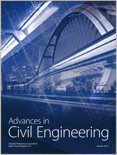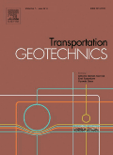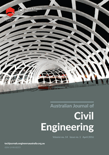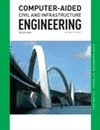
Civil Engineering Journal-Tehran
Scope & Guideline
Advancing Civil Engineering Knowledge from Tehran to the World.
Introduction
Aims and Scopes
- Sustainable Infrastructure Development:
Research focusing on sustainable practices in civil engineering, including the use of eco-friendly materials, recycling, and innovative construction techniques aimed at reducing environmental impact. - Structural Engineering Innovations:
Studies on the design, analysis, and performance of structures, including advancements in materials such as fiber-reinforced composites, and methods for enhancing structural resilience against seismic and other loads. - Geotechnical Engineering Applications:
Research addressing soil behavior, stabilization techniques, and foundation design, particularly in challenging geological conditions and its impact on infrastructure. - Traffic and Transportation Engineering:
Investigations into traffic management, transportation systems, and urban mobility solutions, including the application of machine learning and GIS for traffic prediction and infrastructure planning. - Water Resource Management and Environmental Engineering:
Studies focused on water quality assessment, flood management, and the impact of climate change on hydraulic systems, emphasizing integrated approaches to water resource management. - Construction Management and Project Delivery:
Research on project management methodologies, risk assessment, and the implementation of technologies like BIM and IoT in enhancing construction efficiency.
Trending and Emerging
- Climate-Resilient Infrastructure:
An increasing number of studies focus on designing infrastructure that can withstand climate change impacts, including extreme weather events and rising sea levels, emphasizing the importance of adaptability in civil engineering. - Integration of AI and Machine Learning:
The application of artificial intelligence and machine learning in predicting structural performance, optimizing construction processes, and enhancing project management is gaining traction, showcasing the journal's commitment to modern methodologies. - Green Materials and Sustainable Practices:
Research on the use of green materials, such as recycled aggregates and industrial by-products, is on the rise, highlighting the industry's shift towards sustainability and resource efficiency. - Advanced Construction Technologies:
Emerging technologies such as 3D printing, modular construction, and the use of IoT in construction management are increasingly featured, indicating a trend towards innovative construction practices. - Seismic Resilience and Disaster Mitigation:
There is a growing focus on enhancing the seismic resilience of structures and developing methodologies for disaster risk reduction, reflecting the importance of safety in civil engineering.
Declining or Waning
- Traditional Materials Research:
There has been a noticeable decrease in studies focused solely on traditional materials like plain concrete, as researchers shift towards innovative materials and sustainable alternatives. - Conventional Water Management Techniques:
Research publications on conventional water management practices have diminished, reflecting a transition towards more integrated and sustainable approaches to water resource management. - Static Structural Analysis:
The frequency of papers focusing exclusively on static analysis methods for structures has declined, with a growing emphasis on dynamic analysis and resilience under various loading conditions. - Historical and Cultural Infrastructure Studies:
Research on historical and cultural aspects of civil engineering, while still important, has seen a decrease as the journal pivots towards more contemporary engineering challenges and solutions. - Basic Traffic Engineering Principles:
There is a waning interest in basic traffic engineering principles, with a shift towards advanced modeling techniques and smart transportation systems.
Similar Journals

Gradevinar
Pioneering Developments in Civil and Structural EngineeringGradevinar, published by the Croatian Society of Civil Engineers-HSGI, is a leading Open Access journal in the field of Civil and Structural Engineering, with a significant history that dates back to its inception in 1980. This journal, with the ISSN 0350-2465 and E-ISSN 1333-9095, has established itself as a vital platform for disseminating innovative research and practical developments in civil engineering, particularly since it became Open Access in 2000, facilitating unrestricted access to its wealth of knowledge. As of 2023, Gradevinar is ranked in the third quartile (Q3) of Scopus’s Civil and Structural Engineering category, demonstrating its growing influence and relevance in the academic community, with a current ranking of #255 out of 379 journals in the field. Researchers, professionals, and students benefit from this journal's commitment to high-quality content that reflects the latest advancements and best practices in civil engineering, contributing to both technical proficiency and sustainable development in infrastructure projects across Croatia and beyond.

Built Environment Project and Asset Management
Elevating Standards in Built Environment ResearchBuilt Environment Project and Asset Management is an esteemed academic journal published by Emerald Group Publishing Ltd, dedicated to advancing knowledge and research within the fields of architecture, building and construction, civil and structural engineering, and urban studies. With an impressive impact factor reflected in its Q1 and Q2 rankings across various categories, the journal serves as a critical platform for scholars, practitioners, and students seeking to explore the intersections of project management and asset optimization in the built environment. Covering a breadth of topics from sustainable construction practices to innovative management strategies, Built Environment Project and Asset Management promotes high-quality studies and practical applications that contribute significantly to the discipline. With a commitment to the dissemination of impactful research, this journal is a vital resource for those aiming to influence policy and practice in the evolving landscape of the built environment.

Advances in Civil Engineering
Pioneering Solutions for Sustainable DevelopmentAdvances in Civil Engineering is a leading peer-reviewed journal published by HINDAWI LTD, dedicated to advancing knowledge and innovation in the field of civil and structural engineering. Holding an esteemed Q2 ranking in the 2023 category for Civil and Structural Engineering, this journal serves as a vital platform for disseminating cutting-edge research and practical applications that address contemporary challenges in infrastructure development, sustainable design, and material science. Launched in 2008 and operating as an Open Access journal since 2009, it promotes the free exchange of ideas by ensuring that all articles are accessible to researchers, professionals, and students globally. The journal is also indexed in Scopus, ranking at #142 out of 379 in its category, situating it within the 62nd percentile of its peers. With a focus on interdisciplinary collaboration and innovative solutions, Advances in Civil Engineering contributes significantly to the ongoing evolution of engineering practices and education, making it an essential resource for anyone involved in or studying the ever-evolving field of civil engineering.

Transportation Geotechnics
Exploring Groundbreaking Research in Geotechnical Engineering.Transportation Geotechnics is a premier academic journal published by Elsevier, focusing on the intersection of geotechnical engineering and transportation systems. With an impressive impact factor and categorized in the Q1 quartile across multiple disciplines including Civil and Structural Engineering, Geotechnical Engineering, and Transportation, this journal stands as a vital resource for researchers and practitioners alike. It covers a broad spectrum of topics ranging from soil behavior in transport contexts to innovative materials and methods that enhance infrastructure stability and performance. As an essential platform fostering knowledge dissemination, Transportation Geotechnics enables contributors to share their groundbreaking findings while providing readers with access to cutting-edge research and reviews from 2014 to 2024. Its illustrious Scopus rankings place it prominently in the global research landscape, making it an indispensable tool for students, professionals, and academics dedicated to advancing the field.

Australian Journal of Civil Engineering
Advancing the Future of Civil EngineeringThe Australian Journal of Civil Engineering, published by Taylor & Francis Ltd, stands as a pivotal platform within the field of civil and structural engineering. With an ISSN of 1448-8353 and an E-ISSN of 2204-2245, this journal consistently delivers high-quality research and innovative practices from both established and emerging scholars in the discipline. Recognized in the Q2 category for Civil and Structural Engineering in 2023, it holds a respectable position, ranking 146 out of 379 within its field according to Scopus, which places it in the 61st percentile. Converging valuable insights from 2011 through 2024, the journal encompasses a broad scope of topics, including sustainable infrastructure, innovative materials, and advanced construction techniques, thereby addressing contemporary challenges faced by engineering professionals. Though it is a traditional publication without open access options, the quality of the research featured ensures that it remains an essential resource for academics, practitioners, and students striving to enhance their knowledge and contribute to the dynamic field of civil engineering.

CANADIAN JOURNAL OF CIVIL ENGINEERING
Advancing Civil Engineering Knowledge Since 1971Canadian Journal of Civil Engineering, published by Canadian Science Publishing, serves as a premier platform for the dissemination of innovative research and development in the fields of civil and structural engineering, as well as environmental science. Established in 1971, this journal maintains a robust reputation, achieving a Q3 ranking in both civil engineering and general environmental science categories as of 2023. While it does not currently offer open access, the journal is accessible to a wide audience of researchers, professionals, and students who are keen to stay abreast of the latest advancements in civil engineering practices. With a significant number of yearly publications and a committed editorial board, the Canadian Journal of Civil Engineering contributes to the foundational knowledge and practical applications in the engineering community, thereby playing a critical role in addressing contemporary challenges in civil infrastructure and environmental sustainability.

Jordan Journal of Civil Engineering
Exploring New Horizons in Civil EngineeringThe Jordan Journal of Civil Engineering, ISSN 1993-0461 and E-ISSN 2225-157X, serves as a pivotal platform for research dissemination in the field of civil engineering. Published by Jordan University of Science & Technology, this journal has established itself as a vital resource since its inception in 2007 and continues to impact the academic community with its wide-ranging scope covering innovative practices and cutting-edge research in civil and structural engineering. Holding a respectable Q3 ranking in the 2023 category, with Scopus positioning it at rank #235 out of 379, the journal reflects growing recognition within its discipline. Although currently not an open-access publication, it provides essential insights that can benefit researchers, industry professionals, and students seeking to contribute to advancements in civil engineering through rigorous scholarly articles and studies up to 2024. Its commitment to high academic standards enhances the relevance and importance of its contributions to both local and global engineering practices.

Revista Ingenieria de Construccion
Shaping Tomorrow's Infrastructure Through Rigorous ResearchRevista Ingenieria de Construccion is a prominent open-access journal dedicated to advancing knowledge and practice in the fields of building and construction engineering, as well as civil and structural engineering. Published by the Pontificia Universidad Católica de Chile, specifically the Department of Engineering and Construction Management, this journal has been providing free access to quality research outputs since 1986, ensuring that vital information is available to both practitioners and academics globally. With its current placement in the Q4 category of both the Building and Construction and Civil and Structural Engineering quartiles, it serves as a platform for innovative studies and critical discussions, positioning itself strategically within the academic landscape. The journal is indexed in Scopus, ranking #157 in Building and Construction and #291 in Civil and Structural Engineering, reflecting the growing impact and relevance of its contributions. Researchers, professionals, and students are encouraged to engage with the rigorous and diverse content published within its pages, fostering a vibrant academic and practical discourse.

Advances in Civil and Architectural Engineering
Innovating Tomorrow's Infrastructure TodayAdvances in Civil and Architectural Engineering is a cutting-edge scholarly journal dedicated to the dissemination of pioneering research in the realm of civil engineering and architecture. Published by the esteemed Josip Juraj Strossmayer University of Osijek, Faculty of Civil Engineering and Architecture, this journal operates under an Open Access model since 2022, allowing for unrestricted access to its rich repository of articles. The journal aims to bridge the gap between academia and industry by providing a platform for innovative studies, technical advancements, and best practices that contribute to the evolution of sustainable construction and architectural design. With its focus on interdisciplinary approaches and contemporary challenges in the field, Advances in Civil and Architectural Engineering serves as an invaluable resource for researchers, professionals, and students seeking to enhance their understanding and impact in this vital area of engineering. The journal's ISSN is 2975-3848, and it is committed to fostering the advancement of knowledge and collaboration within the global engineering community.

COMPUTER-AIDED CIVIL AND INFRASTRUCTURE ENGINEERING
Pioneering New Frontiers in Civil and Structural EngineeringCOMPUTER-AIDED CIVIL AND INFRASTRUCTURE ENGINEERING, published by WILEY, stands as a leading journal in the domains of civil and structural engineering, computational theory, and computer-aided design since its inception in 1986. With an impressive ISSN of 1093-9687 and E-ISSN of 1467-8667, this esteemed UK-based journal holds a prestigious position in the academic community, reflected by its Q1 ranking in numerous relevant categories, including Civil and Structural Engineering and Computer Graphics as of 2023. The journal is renowned for promoting innovative research that utilizes computational techniques to solve complex engineering problems, making it an essential resource for researchers, professionals, and students alike. Despite its lack of open access options, the journal garners significant interest due to its rigorous peer-review process and high-impact articles, underlining its importance in the advancement of infrastructure engineering practices and technologies. With a Scopus ranking placing it among the top journals in various engineering and computer science fields, COMPUTER-AIDED CIVIL AND INFRASTRUCTURE ENGINEERING continues to foster knowledge and collaboration, ultimately contributing to the future of smart and resilient infrastructure development.